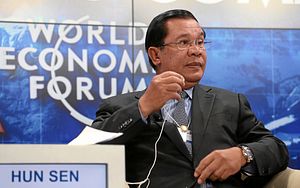2017 has been an extraordinary year for Cambodia. Former opposition leader Kem Sokha was arrested in September over a treason charge and his Cambodia National Rescue Party (CNRP) was dissolved in November. The ruling Cambodian People’s Party (CPP) government forced some civil society and media organizations to close down due to failures to meet local laws, which some viewed as a systematic crackdown.
In response to the plummeting democratic institutions in the country, the United States and the European Union condemned the CPP government and called the moves against the opposition and against civil society a serious threat to democracy.
The Australian and Japanese governments have also raised concerns. Japanese State Minister for Foreign Affairs Kazuyuki Nakane “expressed concern over the dissolution of the opposition party, which received support from many Cambodian citizens at the previous election.” Australian Foreign Minister Julie Bishop agreed that the development has serious implications for democracy in Cambodia: “As a friend of Cambodia, Australia urges the Cambodian government to allow all its citizens to exercise their democratic rights, particularly ahead of the 2018 national election,” she said in a statement.
U.S. legislators and the EU Parliament have called for sanctions on Cambodia, including asset freezes for high-ranking Cambodian officials. Worse for Cambodia would be the removal of preferential tax-free and quota-free access to U.S. and EU markets for Cambodian-made textile and footwear products under the European Union’s ‘Everything But Arms’ scheme and the United States’ Generalized System of Preferences.
The United States has already imposed visa sanctions on high-ranking Cambodian government officials. The U.S. Department of State announced on December 6, 2017 that it “will restrict entry into the United States of those individuals involved in undermining democracy in Cambodia.” The EU Parliament adopted a resolution on December 13, calling for “a list of individuals responsible for the dissolution of the opposition and other serious human rights violations in Cambodia with a view to imposing possible visa restrictions and asset freezes on them.”
The United States has promised more concrete measures to force the Cambodian government to reverse steps that “backtracked on democracy,” and has called upon Cambodia to have a free and fair election in 2018. Without the meaningful and full participation of the main opposition party, the legitimacy of the government created after the election will be in question. The United States, the European Union, and U.S. allies will likely not recognize the election results.
These harsh measures on Cambodia could be regarded as double standards, as similar cases in the region that were proportionally addressed. The unpopular military coup in Thailand in 2014 illustrated a serious decline in democracy, but Thailand has not faced any sanctions from the West. There are neither sanctions to date for serious human rights violations in Myanmar relating to the Rohingya crisis nor any on the Philippines over the extrajudicial killings of thousands under Duterte’s war on drugs.
In the face of this international pressure, Cambodian Prime Minister Hun Sen has encouraged the United States and the European Union to impose sanctions. Speaking to national athletes on December 15, Hun Sen said, “I encourage the European Union and United States to freeze the wealth of Cambodian leaders abroad.” He added that he has no money abroad so any sanctions would not harm him.
Meanwhile former head of the Cambodia National Rescue Party Sam Rainsy has accelerated his political campaign to gain support from the Cambodian diaspora and the international community. He recently called upon the Cambodian armed forces to disrespect orders from their commanders or Hun Sen to use violence against the people. The government regards his campaign as inciting national disorder and instability.
Cambodian democracy remains young and vulnerable to power conflicts. Although Cambodian society has largely embraced democratic values, the country’s democratic institutions have not been proportionally strengthened — power politics remain at the core of the political playbook. Deep political distrust between opposing political camps has further backtracked democratic development in the country, and there is currently no strong neutral force in place to promote political negotiation and reconciliation.
The international sanctions that the United States and the European Union may impose are unlikely to create favorable conditions for political dialogue while China lends its full support to Hun Sen’s regime. A people’s revolution is highly unlikely given most Cambodians are not interested in regime change through revolution. Cambodia’s political outlook is bleak unless there emerges an effective force or mechanism to encourage or force conflicting parties into dialogue.
Vannarith Chheang is a visiting Fellow at the ISEAS-Yusof Ishak Institute in Singapore. This article originally appeared over at East Asia Forum here and is republished with kind permission.

































